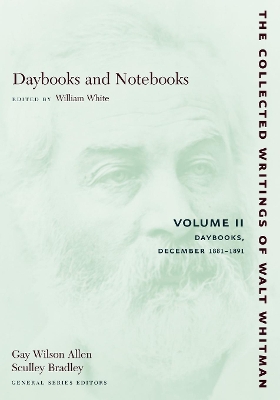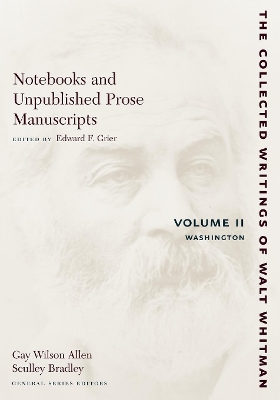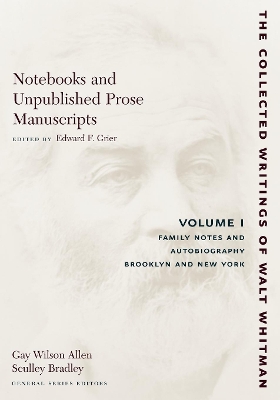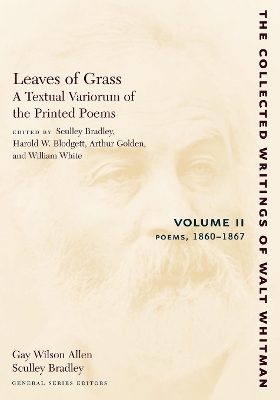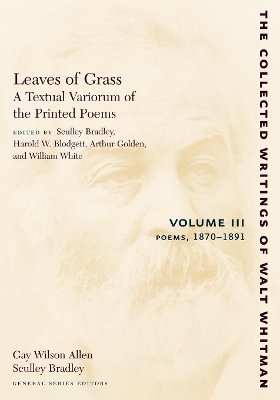Collected Writings of Walt Whitman
26 total works
General Series Editors: Gay Wilson Allen and Sculley Bradley
Originally published between 1961 and 1984, and now available in paperback for the first time, the critically acclaimed Collected Writings of Walt Whitman captures every facet of one of America's most important poets.
Daybooks and Notebooks is an invaluable source for reference on Whitman's daily activities. This sixteen-year record supplements the biographical information provided in the six volumes of Whitman's Correspondence, functioning as an account book, diary, journal, commonplace book, and notebook all in one.
When Whitman began to keep them, the Daybooks were a personal record of predominantly business matters. As William White wrote in the introduction, "He was not only the author but the publisher of his works: he was likewise his own business manager, ship, and promoter. Whatever records he kept, of his sales and distribution, of printing and binding figures, of poetry and prose he sent to newspapers and magazines . . . he entered on the right-hand pages." Volume II thus offers a rare look at Whitman as a businessman, tending as much to practical matters as to art.
General Series Editors: Gay Wilson Allen and Sculley Bradley
Originally published between 1961 and 1984, and now available in paperback for the first time, the critically acclaimed Collected Writings of Walt Whitman captures every facet of one of America's most important poets.
Notebooks and Unpublished Prose Manuscripts gathers Whitman's autobiographical notes, his views on contemporary politics, and the writings he made as he educated himself in ancient history, religion and mythology, health (including phrenology), and word-study. Included is material on his Civil War experiences, his love of Abraham Lincoln, his descriptions of various trips to the West and South and of the cities in which he resided, his generally pessimistic view of America's prospects in the Reconstruction and the Gilded Age, and his reminiscences during his final years and his preoccupation with the increasing ailments that came with old age. Many of these notes served as sources for his poetry-first drafts of some of the poems are included as they appear in the notes-and as the basis for his lectures.
General Series Editors: Gay Wilson Allen and Sculley Bradley
Originally published between 1961 and 1984, and now available in paperback for the first time, the critically acclaimed Collected Writings of Walt Whitman captures every facet of one of America's most important poets.
Notebooks and Unpublished Prose Manuscripts gathers Whitman's autobiographical notes, his views on contemporary politics, and the writings he made as he educated himself in ancient history, religion and mythology, health (including phrenology), and word-study. Included is material on his Civil War experiences, his love of Abraham Lincoln, his descriptions of various trips to the West and South and of the cities in which he resided, his generally pessimistic view of America's prospects in the Reconstruction and the Gilded Age, and his reminiscences during his final years and his preoccupation with the increasing ailments that came with old age. Many of these notes served as sources for his poetry-first drafts of some of the poems are included as they appear in the notes-and as the basis for his lectures.
General Series Editors: Gay Wilson Allen and Sculley Bradley
Originally published between 1961 and 1984, and now available in paperback for the first time, the critically acclaimed Collected Writings of Walt Whitman captures every facet of one of America's most important poets.
In discussing letter-writing, Whitman made his own views clear. Simplicity and naturalness were his guidelines. "I like my letters to be personal-very personal-and then stop." This collection of nearly 3,000 letters written over a half century reveals Whitman the man as no other documents can.
Volume I includes the poet's correspondence from Washington, DC, during the Civil War, where he nursed wounded and dying soldiers.
Volume II presents the poet during the years he was developing an international reputation. As they came to understand one of the most important American voices of the century, European writers such as Edward Dowden and John Addington Symonds began to correspond with Whitman.
Volume III covers the years in which Whitman radiated a personal and artistic magnetism, despite the paralysis that struck him in 1873. This period was full of important events, including the attempted censoring of Leaves of Grass, Whitman's renewed friendship with William D. O'Connor, and the arrival in America of Whitman's unrequited lover, Anne Gilchrist.
Volumes IV and V cover the last seven years of Whitman's life, giving an almost day-by-day account of his long struggle with various ailments, his stoical acceptance of constant pain, but also his continuing energy.
Volume VI offers updates, corrections, and an index to the preceding volumes in the set.
Leaves of Grass, A Textual Variorum of the Printed Poems: Volume II: Poems
by Walt Whitman
Throughout his life, Walt Whitman continually revised and re-released Leaves of Grass. He added and deleted words, emended lines, divided poems, dropped and created titles, and shifted the order of poems. Leaves of Grass: A Textual Variorum of the Printed Poems includes all the variants that Whitman ever published, from the collection’s first appearance in 1855 through the posthumous “Old Age Echoes” annex printed in 1897. Each edition was unique, with its own character and emphasis, and the Textual Variorum enables scholars to follow the development of both the individual poems and the work as a whole.
Volume I contains introductory material, including a chronology of the poems and a summary of all the editions and annexes, along with the poems from 1855 and 1856. Volume II includes the poems from 1860 through 1867, including the first appearance of “When Lilacs Last in the Door-Yard Bloom’d” and “O Captain! my Captain!” Volume III features the poems 1870–1891, plus the “Old Ages Annex” and an index to the three-volume set.
Leaves of Grass, A Textual Variorum of the Printed Poems: Volume III: Poems
by Walt Whitman
Throughout his life, Walt Whitman continually revised and re-released Leaves of Grass. He added and deleted words, emended lines, divided poems, dropped and created titles, and shifted the order of poems. Leaves of Grass: A Textual Variorum of the Printed Poems includes all the variants that Whitman ever published, from the collection’s first appearance in 1855 through the posthumous “Old Age Echoes” annex printed in 1897. Each edition was unique, with its own character and emphasis, and the Textual Variorum enables scholars to follow the development of both the individual poems and the work as a whole.
Volume I contains introductory material, including a chronology of the poems and a summary of all the editions and annexes, along with the poems from 1855 and 1856. Volume II includes the poems from 1860 through 1867, including the first appearance of “When Lilacs Last in the Door-Yard Bloom’d” and “O Captain! my Captain!” Volume III features the poems 1870–1891, plus the “Old Ages Annex” and an index to the three-volume set.
